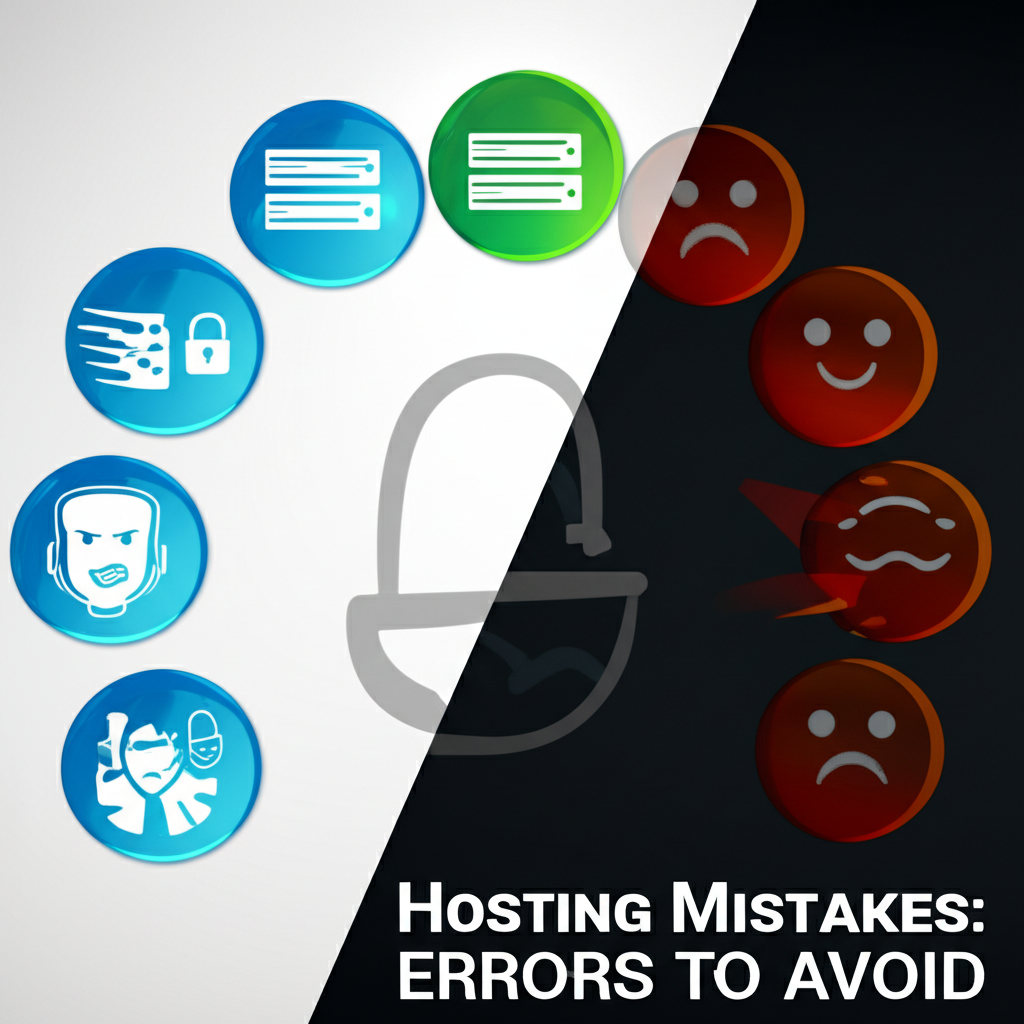- Common Hosting Mistakes: Choosing the Wrong Plan
- Shared Hosting Pitfalls: Not Considering Resource Limits
- Hosting Mistakes Related to Security
- Ignoring SSL Certificates: A Major Security Oversight
- Neglecting Regular Backups: Risking Data Loss
- Performance-Related Hosting Mistakes: Optimizing for Speed
- Overlooking Caching Mechanisms: Slowing Down Your Site
- Not Optimizing Images: A Common Performance Bottleneck
- Other Crucial Hosting Mistakes to Avoid
- Neglecting Website Monitoring: Staying in the Dark
- Poor Communication with Your Hosting Provider: A Recipe for Frustration
- Not Understanding Your Hosting Agreement: Potential Hidden Costs
- Failing to Plan for Scalability: Limiting Future Growth
Hosting Mistakes: 10 Must-Avoid Errors That Can Cripple Your Website
Hosting mistakes can significantly impact your website’s performance, security, and overall success. Choosing the wrong hosting plan, neglecting security measures, or failing to optimize your website can lead to slow loading times, security breaches, and ultimately, lost visitors and revenue. Avoiding these common pitfalls is crucial for maintaining a healthy and thriving online presence. This article outlines ten hosting mistakes you absolutely must avoid.
Common Hosting Mistakes: Choosing the Wrong Plan
One of the most fundamental hosting mistakes is selecting an unsuitable hosting plan. Opting for a shared hosting plan when your website experiences high traffic can lead to slow loading speeds and poor performance. Conversely, investing in a dedicated server when your traffic is low can be an unnecessary expense. Carefully analyze your website’s traffic, resource requirements, and future growth projections before settling on a hosting plan. Consider factors like storage space, bandwidth, and the number of allowed domains.
Shared Hosting Pitfalls: Not Considering Resource Limits
Within the realm of shared hosting, a common oversight is neglecting the resource limitations. Shared hosting environments house multiple websites on a single server, meaning resources are shared. If your website consumes excessive resources, it can impact the performance of other websites on the server, potentially leading to your account being suspended. Monitor your resource usage regularly and upgrade to a more robust plan, like VPS or dedicated hosting, if necessary.
Hosting Mistakes Related to Security
Security is paramount in website hosting. Neglecting essential security measures can leave your website vulnerable to attacks.
Ignoring SSL Certificates: A Major Security Oversight
Failing to install an SSL certificate is a significant security lapse. SSL certificates encrypt the communication between your website and visitors’ browsers, protecting sensitive data like passwords and credit card information. In today’s digital landscape, an SSL certificate isn’t just a recommendation; it’s a necessity for building trust and ensuring data security.
Neglecting Regular Backups: Risking Data Loss
Another crucial security aspect often overlooked is regular backups. Hardware failures, software glitches, or even malicious attacks can lead to data loss. Regular backups ensure you have a recent copy of your website’s data readily available for restoration, minimizing downtime and potential damage.
Performance-Related Hosting Mistakes: Optimizing for Speed
Website speed significantly impacts user experience and search engine rankings. Several hosting-related factors can influence your website’s loading times.
Overlooking Caching Mechanisms: Slowing Down Your Site
Caching stores frequently accessed data in a temporary storage location, allowing for faster retrieval. Not utilizing caching mechanisms can lead to slower loading times, especially for websites with dynamic content. Implementing browser caching, server-side caching, and a Content Delivery Network (CDN) can significantly improve website speed.
Not Optimizing Images: A Common Performance Bottleneck
Large image files can significantly slow down your website. Optimizing images by compressing them without compromising quality is essential for improving loading times. Utilize image optimization tools and techniques to reduce file sizes and enhance website performance.
Other Crucial Hosting Mistakes to Avoid
Beyond security and performance, several other hosting mistakes can negatively impact your website.
Neglecting Website Monitoring: Staying in the Dark
Failing to monitor your website’s performance and uptime can leave you unaware of potential issues. Implement website monitoring tools to track uptime, loading times, and resource usage. These tools can alert you to problems, allowing for prompt intervention and minimizing downtime.
Poor Communication with Your Hosting Provider: A Recipe for Frustration
Effective communication with your hosting provider is essential. When encountering issues, clearly communicate the problem and provide relevant details. A responsive and supportive hosting provider can be invaluable in resolving technical challenges and ensuring smooth website operation.
Not Understanding Your Hosting Agreement: Potential Hidden Costs
Before signing up with a hosting provider, thoroughly review the hosting agreement. Understand the terms of service, including bandwidth limitations, resource allocation, and acceptable usage policies. This prevents unexpected surprises and ensures a clear understanding of the services you are receiving.
Failing to Plan for Scalability: Limiting Future Growth
As your website grows, its resource requirements will also increase. Failing to plan for scalability can lead to performance issues and downtime as your website outgrows its current hosting plan. Choose a hosting provider and plan that allows for seamless scaling as your website expands.
By avoiding these ten hosting mistakes, you can ensure your website performs optimally, remains secure, and is well-positioned for future growth. Careful planning, proactive security measures, and ongoing optimization are crucial for maintaining a successful online presence.











Leave a Reply